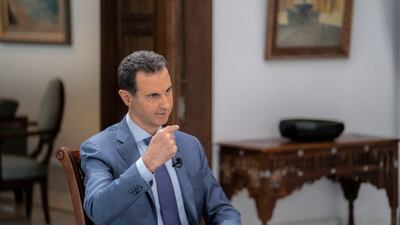US President Joe Biden's administration on Friday responded to Syrian President Bashar Al Assad's claims that Damascus has managed to circumvent international sanctions, including those issued through the Caesar Act.
“Bashar Al Assad is attempting to minimise the effect of sanctions, which reflect near-unanimous international condemnation of his regime’s abuses and atrocities,” a White House National Security Council official told The National.
The strong tone from Washington came after Mr Al Assad said in a rare interview with Sky News that the US sanctions regime has not taken a serious financial toll on Damascus.
Mr Al Assad specifically referenced the 2020 Caesar Act, named after the Syrian whistleblower who provided evidence of regime abuses under the name “Caesar” to protect his identity. The act issued a tough round of sanctions against the Syrian regime.
“The Caesar Act, no doubt, is an obstacle but we managed in several ways to bypass this law. It is not the biggest obstacle, the biggest obstacle is the destruction of infrastructure by terrorists,” Mr Al Assad said.
The US official added that US sanctions would remain in place until Washington “sees progress” on a resolution of the Syrian conflict consistent with the 2015 UN Security Council Resolution 2254, which calls for a ceasefire and political settlement in Syria.
“And we have not seen it yet,” the official told The National.
Mike McCaul, the Republican chairman of the House of Representatives Foreign Affairs Committee, also responded to Mr Al Assad's claims.
“US sanctions are carefully designed to target specific individuals and entities responsible for crimes against the Syrian people, while also ensuring aid continues to flow to those who need it most,” he told The National.
“The Syrian pound has been crippled by Assad’s own actions and that of his Russian and Iranian backers, not by US sanctions.”
The NSC's stronger tone on Syria comes after a slight softening in White House rhetoric about bringing Mr Al Assad back into the regional fold.
After Jordan-hosted talks with Arab foreign ministers in anticipation of Syria's return to the Arab League, the White House told The National it was “encouraged to see the joint communique mention many priorities that we and our partners share”.
That comment followed senior administration official Barbara Leaf taking a softer tone on normalisation as well.
“Our approach on that score is that make sure to get something for that engagement,” she said in late March, though she later expressed regret over the comment before the House Foreign Affairs Committee.


